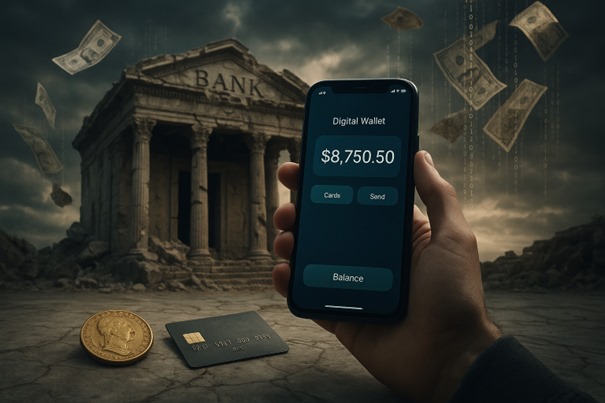What if money, the fuel of our economies, the foundation of every transaction, and the metric by which we measure success — was never real to begin with?
In 2025, with rising inflation, volatile crypto markets, and the global debt ceiling resembling more of a polite fiction than a fiscal limit, more people than ever are asking the unthinkable: What actually gives money its value? And more disturbingly: What happens if we all stop believing in it?
The truth is unsettling. Because once you strip away the symbols, logos, and bank-issued plastics, money — as it exists today — is a social agreement. A shared story. A mass hallucination in which billions participate daily.
We don't trade gold. We don't exchange silver. We don't redeem paper notes for anything physical. And the numbers in your account? They're not stored in vaults — they're just entries in a database, maintained by central banks and private institutions. We swipe cards, tap phones, and confirm payments with facial recognition, all without touching anything of inherent value.
Money today is not a substance. It is belief.
The Fall of the Gold Standard: When Money Lost Its Body
For centuries, money had a body. It was metal — gold, silver, copper — something you could weigh and hold. But that world ended in 1971, when U.S. President Richard Nixon officially severed the dollar's convertibility from gold, effectively killing the gold standard.
From that moment on, the U.S. dollar became a fiat currency — meaning it was backed by nothing except the government's promise and the public's trust.
Other nations followed. In 2025, no major currency in the world is backed by gold, silver, or any physical commodity. All global money is fiat. It exists because we believe it does.
This transformation wasn't just economic — it was philosophical. It turned money into a language, a symbol, a consensus reality.
Debt as Wealth: The Ultimate Paradox
In 2025, most money in circulation doesn't even exist as cash. Over 90% of global currency is digital — not cryptocurrency, but regular dollars, euros, and yen that exist purely as numbers.
More startling? The majority of those numbers are created through debt.
Every time a bank issues a loan, it doesn't lend existing money — it creates new money. This is called fractional reserve banking, where deposits are used to create credit far beyond the actual reserves held. Economies now grow not by saving wealth, but by expanding debt.
Debt is money. And as long as people keep borrowing and repaying, the system keeps spinning.
But this raises a terrifying question: what happens if people stop believing in the value of their debts — or the stability of their banks?
Inflation, Manipulation, and Trust in Decline
In recent years, events like the 2020 pandemic stimulus, the 2022–2024 inflation spikes, and massive quantitative easing by central banks have demonstrated just how elastic money has become.
When central banks need liquidity, they don't print money anymore — they just type larger numbers into their systems.
This elasticity might provide short-term relief, but it erodes long-term confidence. Citizens begin to feel that money isn't something earned or grounded — it's something created arbitrarily. A fiction you're required to participate in — or be left behind.
As trust declines, people turn to alternatives:
- Cryptocurrencies (which have their own belief systems)
- Gold (still symbolic, but tangible)
- Barter, time banks, and decentralized trade systems
In some circles, money is already seen less as "wealth" and more as permission — a license granted by invisible institutions, revocable at will.
What Happens If We Stop Believing?
This is not a theoretical question.
In every economic collapse — from Zimbabwe to Venezuela to Weimar Germany — the same thing happens: people lose faith in the currency, and it collapses not because of lack of paper, but lack of belief.
You don't need to destroy a country to destroy its economy. You just need its people to no longer trust the number on the bill.
If the British pound, the euro, or the U.S. dollar were suddenly declared invalid tomorrow — or if a major central bank was hacked, corrupted, or discredited — the system would unravel in days. Not because the money disappeared, but because its meaning evaporated.
Conclusion: The Theater of Value
In 2025, money is everywhere — and nowhere. It pays for homes that exist mostly on paper, for digital assets with no substance, for services rendered on screens.
And yet, the moment we stop believing in it — it disappears. Not with a bang, but with a blink.
We like to think we live in a world of hard truths and solid assets. But the most powerful force in the modern economy isn't gold, oil, or GDP.
It's collective belief.
And that, perhaps, is what makes it both beautiful — and dangerously fragile.



